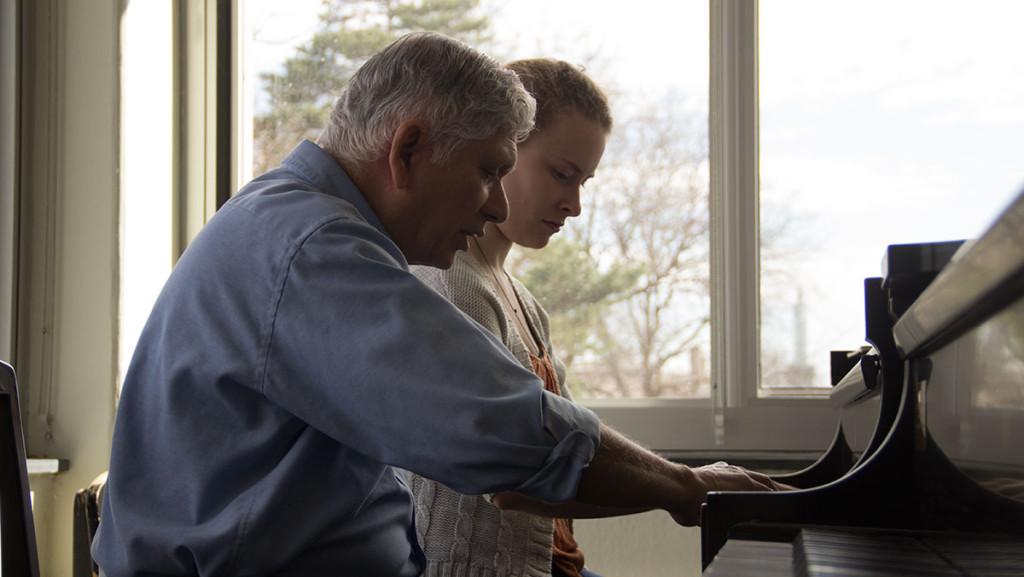It’s hard to find a quiet corner in the James J. Whalen Center for Music, but in the office of Phiroze Mehta, longtime professor of music at Ithaca College, the space is virtually untouched by the cacophony of practicing students. Come summer, however, Mehta will pack up the comfortable, bright little room and leave behind the wall-to-wall view of Cayuga Lake for the last time: After teaching piano performance and literature since 1976 at Ithaca College, he plans to retire this year.
“I don’t know what I’ll miss more: the music or the view,” he said. “Of course I’m joking. I have very mixed feelings about leaving this place. Of course I’m going to miss it. This place is my second home.”
Many of the faculty in the School of Music have been teaching for over two decades. For two of them, this year will be their last as full-time professors at the college: both Mehta and Mark Fonder, professor of music since 1989 and current conductor of the Concert Band. For both professors, teaching music has been a lifelong goal.
“My career objective was always to make music and to help others make music,” Fonder said. “Being a music teacher was the most direct path toward that goal. I feel grateful for all of the opportunities that allowed me to make this come true.”
Fonder’s final concert as conductor of Concert Band, “A Fond(er) Farewell,” will be performed at 8:15 p.m. April 22 in Ford Hall in the Whalen Center and features many of his favorite pieces of band literature. Additionally, he invited Gordon Stout, a professor of music who specializes in percussion education, to perform the xylophone solo in “The Golden Age of the Xylophone” by Floyd E. Werle. Fonder will also host an Ithaca College band reunion from June 12–13. Sophomore Jeannette-Marie Lewis, principal flutist in Concert Band this year, said working with Fonder has made her a better musician.
“It’s hard to compare anyone to him because he has so much experience,” Lewis said. “He knows exactly what he’s looking for within a piece. He feels like he’s really performing with us. You can see the expression on his face, and you know he’s really passionate about what he is doing. I think that’s really special, and it will be hard to find in someone else right away.”
Stout said Fonder’s belief in giving the best education possible to his students has been one of his many strengths over the years.
“He’s been extremely proactive as a music education faculty member,” Stout said. “He’s worked very hard for the music ed department and has always advocated for the students.”
Lewis said for many music students, it’s disappointing when faculty leave, especially in light of the fact that many of the longer-tenured professors in the School of Music will be considering retirement in the next few years.
“When you’re an underclassman, you look forward to being in a variety of ensembles and having multiple professors who you’ve looked up to since you’ve been a freshman,” Lewis said. “It’s sad to see them go, especially having heard such great things about them. It’ll be interesting working with new conductors and seeing what they have to offer to the ensemble.”
Charis Dimaras, professor of music and one of Mehta’s closest friends, said the School of Music has a special atmosphere that allows for new faculty to leave their mark on the school while, at the same time, preserving the memory of those professors who have moved on.
“As far as what we do here, we are fortunate to have people who are talented when they arrive who stay and develop along with the school,” Dimaras said. “Each one of these people, as they leave, create a void. The charge for us who are still here is to look very carefully to find people who will not fully replace, but at least people who will bring that same kind of free spirit that makes us unique here at the School of Music.”
Mehta said he believes it’s important to have a balance of different perspectives on education, with an even mix of older and younger faculty. While newer professors can offer energy and a fresh perspective, those with more experience have indispensable wisdom: An even combination of both is necessary to creating an environment in which students and faculty can thrive.
“I think it’s always nice to have new, young professors,” he said. “I like to think that because at one time I was a young professor, too, and I would like to think that I brought something special to the school when I came here. I have learned a lot of things over the years and, of course, like everyone, I have made a lot of mistakes and I have learned from those mistakes. I hope I can keep learning for the rest of my life. I hope I can keep growing as an intellectual, as a musician, as a human being. That’s what it’s all about.”














